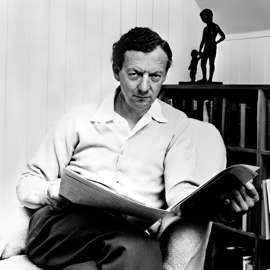- Alfred Deller
- La bohème
- Margaret Juntwait
- David Raksin
- Pietro Metastasio
- Sylvan Kalib
- Edvard Mirzoyan
- Orpheus-Goolboddi
 DISCUSSION: John Dante Prevedini leads a discussion about Composers, individuals or collective?, including contributions from David Arditti, Halida Dinova, Robert McCarney and Jane Stanley.
DISCUSSION: John Dante Prevedini leads a discussion about Composers, individuals or collective?, including contributions from David Arditti, Halida Dinova, Robert McCarney and Jane Stanley.
 SPONSORED: Ensemble. Last Gasp of Boyhood. Roderic Dunnett investigates Jubilee Opera's A Time There Was for the Benjamin Britten centenary.
SPONSORED: Ensemble. Last Gasp of Boyhood. Roderic Dunnett investigates Jubilee Opera's A Time There Was for the Benjamin Britten centenary.
All sponsored features >>
Reginald Smith Brindle
The British composer, painter, teacher and writer Reginald Smith Brindle was born at Cuerden in Lancashire on 5 January 1917. His parents were both amateur musicians who discouraged him from making music his career, but he was drawn to the inevitable, and became one of Britain's most radical modernist composers.
World War II both interrupted and changed his career - whilst in the army he bought a guitar from an Italian prisoner of war and wrote many solo guitar works. (He also played various other instruments, including the organ and the saxophone.) He met and married an Italian girl, Giulia Borsi, and subsequently studied in Italy from 1949, befriending Dallapiccola, Bartolozzi and Donatoni. His 1946 Fantasia Passacaglia won first prize in an Italian competition, and initially he studed at the University College of North Wales in Bangor.
Smith Brindle later lectured at the University College of North Wales and subsequently at the University of Surrey in Guildford, where he established the Tonmeister course. He retired from teaching in 1981 but continued to compose, including Veni Creator, his Second Symphony, completed in 1989, although musical fashion had moved on and, as a composer, he was latterly rather neglected.
Smith Brindle is known for his output of solo guitar music. He also wrote a chamber opera, The Death of Antigone, first performed in 1971 at Oxford.
Reginald Smith Brindle died on 9 September 2003 in Caterham, Surrey, UK, aged eighty-six.

